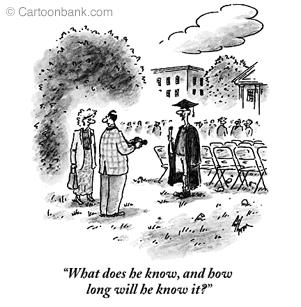30 May 2011 archive
Are Colleges Delivering? 0
 One of the first questions I will often ask students is, Why do you want to go to college? The question can sometimes be taken as rhetorical. It is not. What really is the purpose of college? This thought provoking inquiry may seem strange from someone who enjoys being part of this milestone step many teens take following high school.
One of the first questions I will often ask students is, Why do you want to go to college? The question can sometimes be taken as rhetorical. It is not. What really is the purpose of college? This thought provoking inquiry may seem strange from someone who enjoys being part of this milestone step many teens take following high school.
But since I have been taking notice of such things in 1984, I have noticed a lowering of academic standards in our secondary schools and since 1992, our colleges. I do not believe the fault lies with teachers and professors as much as it does with the Departments of Education and governmental bureaucracy. Even in the highly touted brand name colleges across the country, too many graduates have not fully developed the critical reading and thinking skills they need to make sound life decisions.
In the last State of the Union address, President Obama called for more Americans to go to college. In referencing one of John Kennedy’s goals in space, he likened this goal as our generation’s Sputnik moment. In the sixties, there certainly was a spike in the advancement of the sciences and humanities, but what now, fifty years later, has changed? Perhaps former President G.W. Bush unwittingly exemplified the answer best when he said, “You teach a child to read, and he or her will be able to pass a literacy test.”
 According to authors and researchers, Richard Arum and Josipa Roksa, the primary problem today is the lack of academic rigor. In their recently published tome, Academically Adrift: Limited Learning on College Campuses they have confirmed what many observers believed regarding higher education… it is not delivering it. Recognition of the problem, however, is just the first step toward positive solutions. College English Professor, William Pannapacker, has written a very insightful analysis of why the vast majority of college undergraduates are not learning. He writes, Why should we send more students to college at an ever greater cost when more than a third of them, according to Arum and Roksa, demonstrate “no improvement in critical thinking, complex reasoning, and writing skills” after four years of education? What good does it do to increase the number of students in college if the ones who are already there are not learning much? Would it not make more sense to improve the quality of education before we increase the number of students? In the Chronicle of Higher Education, he beautifully outlines the reasons for such diminishing results and offers some solutions. Here they are.
According to authors and researchers, Richard Arum and Josipa Roksa, the primary problem today is the lack of academic rigor. In their recently published tome, Academically Adrift: Limited Learning on College Campuses they have confirmed what many observers believed regarding higher education… it is not delivering it. Recognition of the problem, however, is just the first step toward positive solutions. College English Professor, William Pannapacker, has written a very insightful analysis of why the vast majority of college undergraduates are not learning. He writes, Why should we send more students to college at an ever greater cost when more than a third of them, according to Arum and Roksa, demonstrate “no improvement in critical thinking, complex reasoning, and writing skills” after four years of education? What good does it do to increase the number of students in college if the ones who are already there are not learning much? Would it not make more sense to improve the quality of education before we increase the number of students? In the Chronicle of Higher Education, he beautifully outlines the reasons for such diminishing results and offers some solutions. Here they are. 
“You can not solve a problem with the same thinking that created the problem.”
Albert Einstein
